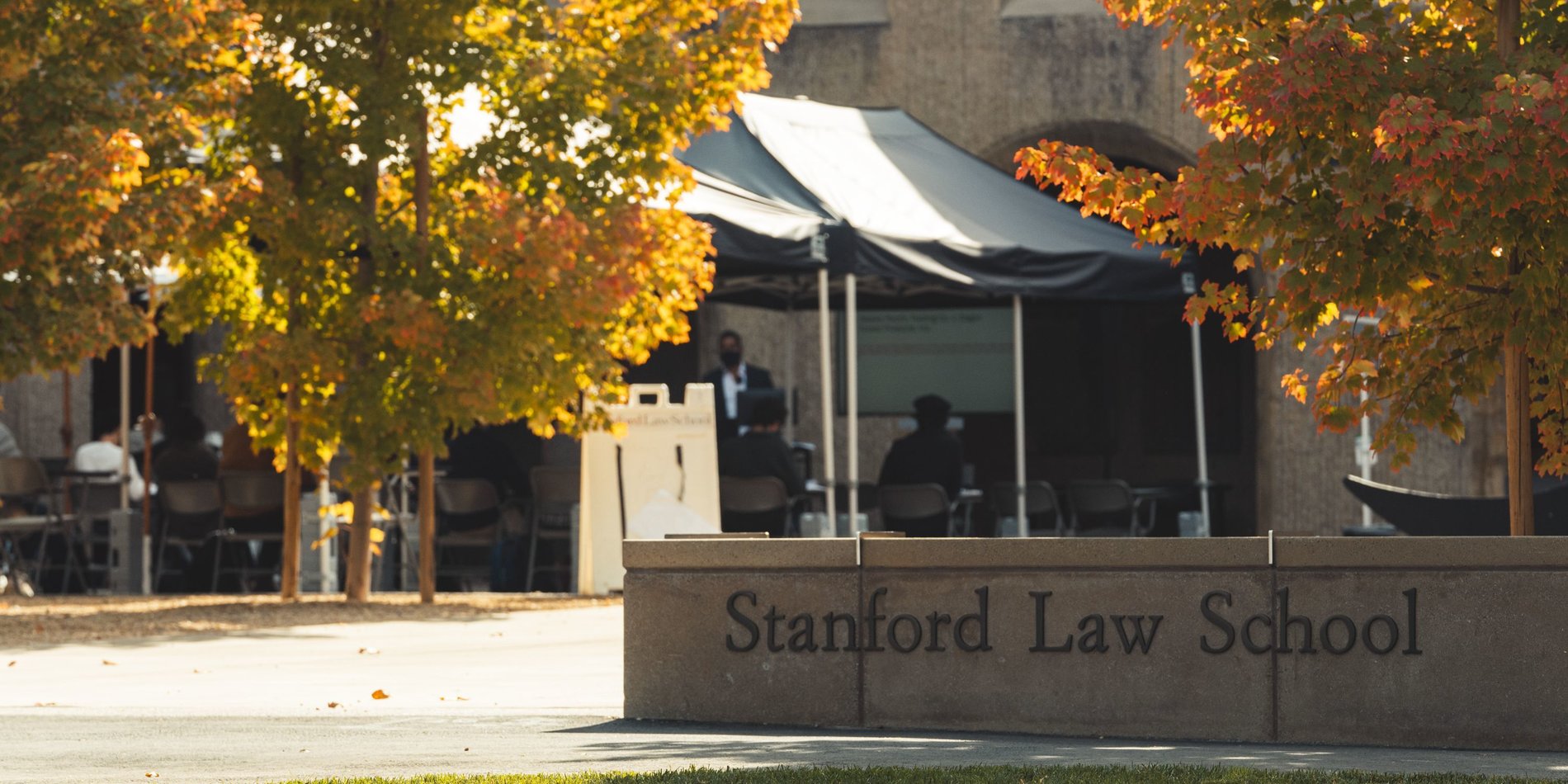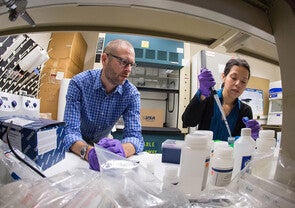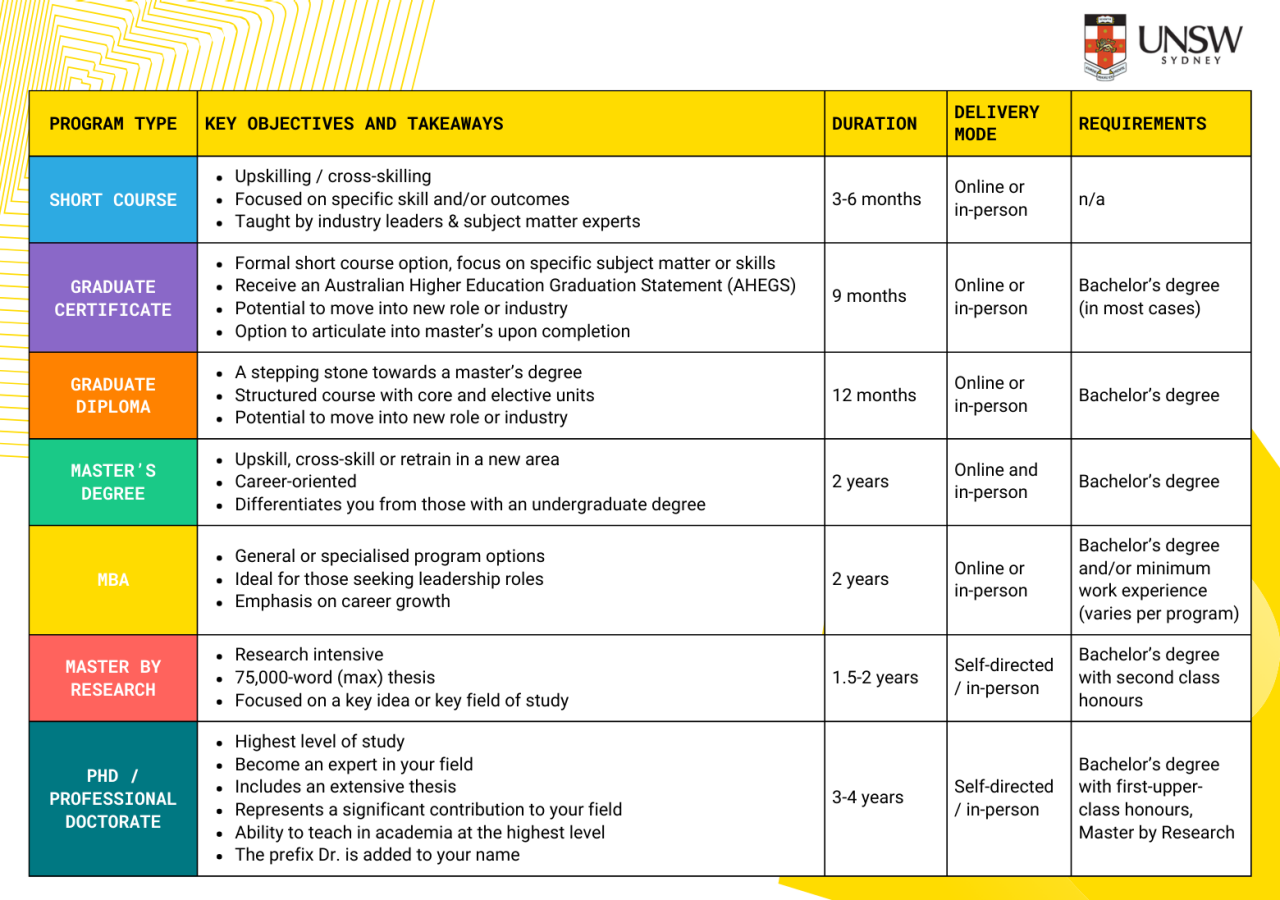- Home »
- Advice »
- Postgraduate Study Advice »

What Is A Postgraduate Degree? A Definition and Guide
Find your perfect postgrad program search our database of 30,000 courses.
One thing that all postgraduate degrees have in common is that they allow you to continue your studies in a specialised subject. An undergraduate degree is usually required for a student to be considered eligbile to study a postgraduate degree.
Postgraduate degrees are taken for a number of different reasons, such as to move into academia and research, or to specialise or advance in a particular career path. Some people choose to complete a postgraduate degree to change study or career paths entirely.
There are a lot of different aspects involved in postgraduate education. If you are considering expanding your knowledge with a postgraduate degree, it’s important to understand the details. This guide covers everything you need to know about postgraduate degrees.
Postgraduate degree versus graduate degree
So, what is the difference between a postgraduate degree and a graduate degree ? The answer is basically nothing! The term 'graduate degree' tends to be more widely used in America, whilst 'postgraduate degree' is usually the preferred terminology in the UK. But both terms mean the same thing – and refer to degrees undertaken after completion of an undergraduate or bachelors degree, for example a masters degree or PhD.
Masters degree
A masters degree is one of the most common postgraduate courses completed after undergraduate study. This postgraduate qualification can take a number of different forms, but what they all have in common is that they usually require an undergraduate degree to gain entry. These forms of postgraduate degree include:
Masters of Arts (MA)
Masters of Science (MSc)
Masters of Philosophy (MPhil)
Masters of Research (MRes)
Masters of Engineering (MEng)
The majority of masters courses require a thesis or dissertation to graduate in addition to any coursework. In the UK, most masters courses are a year in length, apart from some professional masters courses such as Masters of Architecture (MArch) which are generally between two and three years. Most masters courses in the US are two years in duration, as are many masters courses in Europe .
MA, MSc and MPhil
Masters degrees are gained either through a taught or research course . In a taught masters, students are awarded a Masters of Arts (MA), Masters of Science (MSc) or a Master of Philosophy (MPhil) .
MA and MSc are the two most common types of postgraduate degrees. MA courses focus on arts and humanities subjects, whereas MSc degrees focus on STEM subject areas.
An MPhil focuses on advanced research in various fields. It involves independent study and the completion of a substantial thesis or dissertation. While often seen as a pathway to a PhD, it also holds value as a standalone qualification for careers in academia, research or related fields.
An MLitt is quite a rare masters degree option and originates from the ancient universities in England and Scotland. It is a postgraduate degree that's awarded for arts and humanities subjects at select universities in both countries. An abbreviation of Master of Letter – the Latin translation of Magister Litterarum – an MLitt serves as an alternative to the more common MA or MPhil degrees, and can be offered as either a taught or research degree. Relatively few British universities offer the MLitt, and most of these are in Scotland. A very select number of universities in the USA and Australia also offer it as a specialised masters degree option.
MArch and MEng
Some masters courses like an MArch or a Masters of Engineering (MEng) are taken after completing the relevant undergraduate course with a long-term view to qualify as an architect or engineer. These masters programs are essential parts of the qualification routes and those who wish to become architects or engineers must complete them to be able to practise in their chosen career.
Other masters courses are about specialising or focussing on a career choice, especially those in the law or medical professionals. There are some masters courses that are for those graduates who already have a first degree but wish to retrain in another subject, such as a Masters in Town Planning or Masters in Journalism, for these courses it is assumed that the student has a number of academic skills that are transferable to the new subject.
What about an Integrated Masters Degree?
An integrated masters degree combines undergraduate and postgraduate studies in a single program. Students studying an integrated masters will start with a bachelors degree and move seamlessly on to a masters program after completing their undergraduate studies. Common subjects for integrated masters include engineering, natural sciences, mathematics and some social sciences. These programs offer an accelerated path to advanced masters study, allowing students to deepen their expertise while potentially saving time and money.
Apply for one of our x5 bursaries worth £2,000
We've launched our new Postgrad Solutions Study Bursaries for 2024. Full-time, part-time, online and blended-learning students eligible. 2024 & 2025 January start dates students welcome. Study postgraduate courses in any subject taught anywhere worldwide.

A PhD (Doctorate of Philosophy) is the highest level of postgraduate qualification available that can be studied. This advanced postgraduate degree involves an element of both research and working at an institution.
The majority of students who go on to complete a PhD have already undertaken a masters course in a relevant subject. Often, this will be an MPhil or MRes, but this is not exclusively the case. It is mostly those who wish to go into academic research or teaching who decide to complete PhDs. The whole point of a PhD is further specialisation and it's not an option for changing career path, apart from progressing in the world of academia.
Postgraduate diploma
Postgraduate diplomas are taught courses that do not require students to complete a dissertation or thesis. This type of postgraduate qualification offers the same level of study as a masters degree, but is completed over a shorter period of time because it doesn’t require a dissertation.
If you undertake a masters course but do not complete the dissertation this is the postgraduate qualification that you will probably find yourself finishing with. Postgraduate diplomas can be a great way for those who are unsure about whether they need or want to complete a full masters course, whilst still finishing with a postgraduate-level qualification to specialise their knowledge base and advance career skills.
There are some UK professions, such as teaching , that involve a postgraduate diploma ( PGCE in Education ) that allows graduates who did not study teaching to quickly qualify in an education profession.
Postgraduate certificate
Postgraduate certificates are similar to postgraduate diplomas, in that they do not require the completion of a dissertation or thesis in order to get the final qualification. This postgraduate course allows students to gain specialised knowledge in their chosen area in a shorter amount of time. A postgraduate certificate is shorter than a postgraduate diploma, making it one of the shortest postgraduate qualifications to attain.

Applying for a postgraduate degree
There are two main ways to apply for a postgraduate degree in the UK. One is via UCAS (Universities and Colleges Admissions Service), which is the centralised system for students studying an undergraduate degree at a UK university. The other, and more common way to apply for a postgraduate degree is directly through the university. Once you have found the postgraduate degree that you want to apply for, check with the university’s admissions department and find out how best to proceed with your application.
Entry requirements
The entry requirements for postgraduate degrees will vary depending on the level of qualification, the course and the university. In most cases, you will need to have completed an undergraduate degree in order to obtain a postgraduate degree, although some postgraduate qualifications may accept students who have a suitable level of work experience in the subject area.
Higher postgraduate level qualifications, such as a PhD, will usually require you to have both an undergraduate and postgraduate degree in order to have a place on the course. You should always check the specific course requirements when choosing a postgraduate degree.
Funding your postgraduate degree
There are various funding options for postgraduate degrees in the UK – these include scholarships and grants offered by universities based on academic achievement or specific criteria, as well as government-backed student loans covering tuition fees and living expenses. Employer sponsorship is another route, especially for courses relevant to a particular field of work. Research councils provide funding for research-based degrees, while charitable trusts and foundations offer support in diverse fields. Many students also opt for part-time work alongside their studies.
You can find out more about funding your postgraduate degree in our Ultimate Postgraduate Student Funding Guide .
Postgraduate degrees: a summary
A postgraduate degree is an excellent way to specialise, retrain and develop new skills in your chosen subject and career path. Postgraduate degrees tend to be shorter than undergraduate degrees, letting you efficiently gain further qualifications once acquiring basic academic skills from an undergraduate degree.
Further postgraduate study gives students the opportunity to learn and gain a deep understanding of their chosen subject and is well worth the time and money. Having a postgraduate qualification can also help improve your future career prospects, since you have demonstrated both a deeper understanding of a subject area and a determination to complete further academic studies.
Our bursary winner & funding opportunity
Alice Tucker is a 21-year-old student studying an MA in Human Rights at the University of Manchester. She experienced a whole range of emotions when she discovered she was being awarded one of our bursaries, saying, “I was shocked but extremely grateful. Masters degrees are very difficult to fund and I was working two part-time jobs during the final year of my undergraduate degree to save up for this. Even with those savings, I am constantly thinking about how I will make my money last. Having this bursary will definitely remove that pressure for me so that I can focus on studying for my degree.”

Related articles
What Is The Difference Between Graduate & Postgraduate Programs?
What is a Masters Degree?
What is a PhD?
Postgraduate Diploma
What is an MBA?
Master of Arts: What is an MA?
Master of Science: What is an MSc?
Postgrad Solutions Study Bursaries

Exclusive bursaries Open day alerts Funding advice Application tips Latest PG news
Sign up now!

Take 2 minutes to sign up to PGS student services and reap the benefits…
- The chance to apply for one of our 5 PGS Bursaries worth £2,000 each
- Fantastic scholarship updates
- Latest PG news sent directly to you.

What is a PhD?
- Types of Doctorates
- A Doctor of Philosophy (PhD) is the highest globally recognized postgraduate degree that higher education institutions can award.
- PhDs are awarded to candidates who undertake original and extensive research in a particular field of study.
- Full time PhD programmes typically last three to four years, whilst part time PhD programmes typically last six to seven years.
- A PhD can lead to an academia teaching role or a career in research. A PhD can also equip you with skills suitable for a wide range of jobs unrelated to your research topic or academia.
Definition of a PhD – A Doctor of Philosophy (commonly abbreviated to PhD , Ph.D or a DPhil ) is a university research degree awarded from across a broad range of academic disciplines; in most countries, it is a terminal degree, i.e. the highest academic degree possible.
PhDs differ from undergraduate and master’s degrees in that PhDs are entirely research-based rather than involving taught modules (although doctoral training centres (DTCs) offer programmes that start with a year of lecture-based teaching to help develop your research skills prior to starting your project).
In most English-speaking countries, those that complete a PhD use the title “Doctor” (typically abbreviated to Dr) in front of their names and are referred to as such within academic and/or research settings. Those that work in fields outside of academia may decide not to use the formal doctor title but use post-nominal letters (e.g. John Smith PhD); it’s unusual though for someone to use both the Doctor title and post-nominal letters in their name.
PhD vs Doctorate
A PhD and a professional doctorate are both research-based terminal degrees.
However, where a PhD focuses on original research mostly around theoretical concepts, a professional doctorate focuses on examining existing knowledge to solve real-life, practical problems.
While there is much crossover between the two, a PhD is generally better suited for an individual to wants to advance the knowledge and understanding in their field, and a professional doctorate degree is better suited to a working professional who wants to better be able to apply knowledge and understanding to their field.
What Are the Entry Requirements for a PhD?
To be accepted on to a PhD programme, students usually need to hold at least a high ( 2:1 and above ) undergraduate degree that is related to the field of research that they want to pursue. A PhD candidate may also be expected to hold a Master’s degree , however, this does not mean you must have one, as it is still possible to enrol into a PhD without a Master’s .
Self-funded courses may sometimes be more relaxed in relation to entry requirements. It may be possible to be accepted onto a self-funded PhD programme with lower grades, though these students typically demonstrate their suitability for the role through professional work experience.
Whilst a distance learning project is possible , most PhD candidates will carry out their research over at least three years based at their university, with regular contact with two academic supervisors (primary and secondary). This is particularly the case for lab-based projects, however, some PhD projects require spending time on-site away from university (e.g. at a specialist research lab or at a collaborating institution abroad).
How Long Does a PhD Take?
Typically, full-time PhDs last 3-4 years and part-time PhDs last 6-7 years. However, at the discretion of the university, the thesis writing-up period can be extended by up to four years.
Although most doctoral programmes start in September or October, they are generally much more flexible than taught-courses and can start at any time of the year.
How Much Does a PhD Cost?
Tuition fees for UK and EU students vary between £3,000 and £6,000 per year, with the average tuition fee of £4,712 per year for 2023/24 programmes.
Tuition fees increase considerably for international students, varying between £16,000 to £25,000 per year, with an average tuition fee of £19,600 per year .
Nonetheless, most students will secure PhD funding in the form of studentships, scholarships and bursaries to help pay for these fees. These funding opportunities can either be partial, which cover tuition fees only, or full, which cover both tuition fees and living expenses.
UK national students can also apply for Doctoral Loans from Student Finance England if they are unable to secure funding.
Finding a PhD has never been this easy – search for a PhD by keyword, location or academic area of interest.
What Does a PhD Involve?
To be awarded a PhD, a doctoral student is required to produce a substantial body of work that adds new knowledge to their chosen field.
A PhD programme will typically involve four key stages:
Stage 1: Literature Review
The first year of a PhD involves attending regular meetings with your supervisors and carrying out a search on previously published work in your subject area. This search will be used to produce a literature review which should set the context of the project by explaining the foundation of what is currently known within the field of research, what recent developments have occurred, and where the gaps in knowledge are. In most cases, this will be an extension of your research proposal should you have produced one as part of your application. The literature review should conclude by outlining the overarching aims and objectives of the research project. This stage of setting achievable goals which are original and contribute to the field of research is an essential first step in a successful PhD.
The supervisor is the main point of contact through the duration of a PhD – but remember: they are there to mentor, not to teach, or do it for you . It will be your responsibility to plan, execute and monitor your own work as well as to identify gaps in your own knowledge and address them.
Stage 2: Research
The second year (and prehapse some of your third year) is when you work on your research. Having identified novel research questions from your review of the literature, this is where you collect your data to help answer these questions. How you do this will depend on the nature of your doctoral research: for example, you may design and run experiments in a lab alongside other PhD students or visit excavation sites in remote regions of the world. You should check in regularly with your supervisors to update them and run any ideas or issues past them.
Have the structure and chapters of your thesis in mind as you develop and tackle your research questions. Working with a view of publishing your work will be very valuable later on.
Stage 3: Write up of Thesis
The next key stage of a PhD is writing a doctoral thesis , which typically takes from anywhere between three months to one year. A thesis is a substantial body of work that describes the work and outcomes of the research over the previous two to three years. It should tell a detailed story of the PhD project – focusing on:
- The motivations for the research questions identified from the literature review.
- The methodologies used, results obtained, and a comprehensive analysis and discussion of the findings.
- A detailed discussion of the key findings with an emphasis on the original contributions made to your field of research and how this has been impactful.
There is no universal rule for the length of a PhD thesis, but general guidelines set the word count between 80,000 to 100,000 words.
For your thesis to be successful, it needs to adequately defend your argument and provide a unique or increased insight into your field that was not previously available.
Stage 4: Attending the Viva
A viva voce , most commonly referred to as just a ‘ viva ‘, is an interview-style examination where the PhD student is required to engage in a critical appraisal of their work and defend their thesis against at least two examiners. The examiners will ask questions to check the PhD student has an in-depth understanding of the ideas and theories proposed in their thesis, and whether they have developed the research skills that would be expected of them.
The viva is one of the final steps in achieving a PhD, and typically lasts at least two hours, but this duration can vary depending on the examiners, the university and the PhD project itself.
Once you have done the viva – you’re on the home stretch. You will typically be asked to make some amendments to your thesis based on the examiner’s feedback. You are then ready to submit your final thesis for either:
- PhD – If you pass the requirements you will be awarded a PhD degree (most common outcome),
- MPhil – If you failed to meet requirements for a PhD, you may be downgraded to an MPhil degree (uncommon outcome),
- Fail – No award is given, typically for cases of plagiarism (extremely uncommon outcome).
What Is It Like to Undertake a PhD?
We’re often asked what it is like to undertake a PhD study. Unfortunately, this isn’t a simple answer to this question as every research project is different.
To help give insight into the life of a PhD student, we’ve interviewed PhD students at various stages of their programmes and put together a series of PhD Student Interviews . Check out the link to find out what a PhD is like and what advice they have to offer you.
What Are the Benefits of A PhD?
A PhD is the highest globally recognised postgraduate degree that higher education institutions can award. The degree, which is awarded to candidates who demonstrate original and independent research in a particular field of study, is not only invaluable in itself, but sets you up with invaluable skills and traits.
Career Opportunities
First, a PhD prepares you for a career in academia if you wish to continue in this area. This takes form as a career in the Higher Education sector, typically as a lecturer working their way to becoming a professor leading research on the subject you’ve studied and trained in.
Second, a PhD also enables the opportunity for landing a job in a research & development role outside of the academic environment. Examples of this include laboratory work for a private or third sector company, a governmental role and research for commercial and industrial applications.
Transferable Skills
Finally, in possessing a PhD degree, you can show to employers that you have vital skills that make you an asset to any company. Three examples of the transferable skills that you gain through a PhD are effective communication, time management, and report writing.
- Communication – presenting your work in written and oral forms using journal papers and podium presentations, shows your ability to share complex ideas effectively and to those with less background knowledge than you. Communication is key in the professional environment, regardless of the job.
- Time management – The ability to prioritise and organise tasks is a tremendous asset in the professional industry. A PhD holder can use their qualification to demonstrate that they are able to manage their time, arrange and follow a plan, and stick to deadlines.
- Report writing – Condensing three years of work into a thesis demonstrates your ability to filter through massive amounts of information, identify the key points, and get these points across to the reader. The ability to ‘cut out the waffle’ or ‘get to the point’ is a huge asset in the professional industry.
Aside from the above, you also get to refer to yourself as a Doctor and add fancy initials after your name!
What Can I Do After a PhD?
One of the most desirable postdoctoral fields is working within independent Research and Development (R&D) labs and new emerging companies. Both industries, especially R&D labs, have dedicated groups of PhD graduates who lead research activities, design new products and take part in crucial strategic meetings. Not only is this a stimulating line of work, but the average salaries in R&D labs and emerging start-ups are lucrative. In comparison, an undergraduate with five years of experience within their given field will, on average, likely earn less than a new PhD graduate taking on a R&D position.
It’s a common misunderstanding that PhDs only opens the door for an academic career such as university lecturers and training providers. Although obtaining a PhD opens these doors, the opportunities extend far beyond educational roles. In fact, recent data from the UK’s Higher Education Statistics Agency (HESA) indicates only 23% of PhD graduates take a position in educational roles . This low percentage is primarily because PhD graduates have a wide range of skills that make them suitable for a broad spectrum of roles. This is being seen first hand by the increasing number of PhD graduates who are entering alternative roles such as research, writing, law and investment banking.
How Do I Find a PhD?
We appreciate that finding a PhD programme to undertake can be a relatively daunting process. According to Higher Education Student Statistics , over 22,000 PhDs were awarded in 2016/17 within the United Kingdom alone. Clearly there are a huge number of PhD programmes available. This can sometimes be confusing for prospective doctorates, particularly when different programmes are advertised in different places. Often, it is difficult to know where to look or where to even start. We’ve put together a list of useful sources to find the latest PhD programmes:
- A great place to start is with our comprehensive and up-to-date database of available PhD positions .
- Assuming you are still at university, speak to an existing PhD supervisor within your department.
- Attend as many postgraduate open days as you can. Whilst there, speak to current PhD students and career advisors to get an awareness of what PhDs are on offer.
- Visit the postgraduate section of university websites and the PhD Research Council section of the UKRI website.
Browse PhDs Now
Join thousands of students.
Join thousands of other students and stay up to date with the latest PhD programmes, funding opportunities and advice.
Should I Pursue A Master’s or A Ph.D.?

The first step in deciding on the right graduate program for you is to figure out which degree will best serve you—a master’s or a doctor of philosophy (Ph.D.). Here are a few factors to consider.
What are your career goals?
- Professional master’s: A good choice if you want to develop a particular skill set in order to practice a particular profession. This type of degree provides coursework focused on learning and practicing skills.
- Research master’s: A good fit if you want to gain expertise in a discipline and know how to teach it. A research master’s typically includes a research project or thesis and comprehensive exams in addition to coursework and provides experience in research and scholarship.
- Ph.D. (doctor of philosophy): Consider this option if your goal is to ground yourself in a body of research and develop the ability to add to that body of knowledge. Ph.D. study includes a major research project in addition to coursework, and a Ph.D. is the highest scholastic degree awarded by American universities. Contrary to common perception, career paths for Ph.D. graduates are quite varied, not just limited to academia. Ph.D. training helps you hones skills such as writing, research, teaching, data analysis, communicating complex topics—all of which can translate into many sectors, including industry, government, nonprofit, and entrepreneurship.
See career data for Duke graduate programs' alumni
How much time do you have to pursue a graduate degree?
Master’s degrees typically take two years to complete, while Ph.D. programs generally take five to seven years ( see Duke programs' time-to-degree ). That is a significant difference in commitment and opportunity costs. It might also play a key role in deciding which factors take higher priority as you evaluate a program. How does the length of the program fit with your career and family plans? How important is the surrounding community if you are going to be there for seven years instead of two? How long are you able or willing to go on a limited income while in graduate school?
How much can you afford to pay for a graduate degree?
Consider your personal financial situation (e.g., how much savings and student loans do you have), as well as how much financial aid you can get. Master’s and Ph.D. programs differ greatly in the amount of financial aid available. Ph.D. programs tend to offer significantly more financial support than master’s programs (but often will have research or teaching requirements).
A typical Ph.D. financial aid package usually includes coverage of tuition and fees, a living stipend, and some level of support for health insurance for a set number of years. For instance, Duke’s standard Ph.D. package covers tuition, mandatory fees, and a stipend for five years, as well as health insurance premiums for six years.
Within an institution, the level of financial support often differs across programs, so be sure to ask your specific program about the financial aid it offers. There are also many national organizations that provide competitive fellowships and scholarships for graduate students.
Know which degree you want to pursue? Here are some key things to look for in a program .
Share this page
The clinical program is accredited by the American Psychological Association and the Psychological Clinical Science Accreditation System.
Your program will typically be fully funded for five years thanks to stipend grant support and guaranteed teaching fellowships. Tuition support is also available for a six-year program. Funding is also available for research, travel, and conferences. You will have access to the latest technology at FAS Research Computing and the Neuroimaging Facility at the Center for Brain Science.
Examples of student dissertations and theses include “Childhood Anxiety Disorders: Developmental Risk Factors and Predictors of Treatment Response,” “Clarifying the Pathway to Suicide: An Examination of Subtypes of Suicidal Behavior and Their Association with Impulsiveness,” and “A Cognitive Neuroscience of Social Groups.”
Graduates have secured positions in academia at prestigious institutions such as Princeton University, Dartmouth College, and Columbia University. Others have embarked on careers with companies such as Facebook, BetterUp, and Apple.
Additional information on the graduate program is available from the Department of Psychology and requirements for the degree are detailed in Policies .
Areas of Study
Cognition, Brain, and Behavior | Experimental Psychopathology and Clinical | Developmental | Social Psychology
Admissions Requirements
Please review admissions requirements and other information before applying. You can find degree program-specific admissions requirements below and access additional guidance on applying from the Department of Psychology .
Academic Background
While an undergraduate concentration in psychology is not required, some social science coursework is recommended. Because the program is heavily quantitatively oriented, college-level math and statistics are also advised. Research experience is extremely helpful; successful applicants have often worked for professors, done research projects as part of college courses, written an undergraduate thesis, or volunteered in a psychology research lab.
Please Note: Before making the decision to apply, the program in Psychology suggests checking individual faculty/lab websites or emailing faculty directly to inquire whether they plan to consider applicants for Fall 2024 admission. It’s important to note that while individual faculty members may have every intention of bringing in a new student this year, we cannot guarantee that they will all be able to do so. The total number of offers of admission to be extended by the graduate program is based on applicant preparedness and fit, availability of university advising and support resources, and target class size. Some of these factors are not able to be determined until after the applicant pool has been finalized.
Standardized Tests
GRE General: Optional
Theses & Dissertations
Theses & Dissertations for Psychology
See list of Psychology faculty
APPLICATION DEADLINE
Questions about the program.

Welcome to Graduate Admissions
Learn about university-wide admission requirements and processes for MA, MS, PhD, and other non-professional graduate programs.
Your Starting Point for Graduate Study at Stanford
Browse this website to learn about university-wide requirements and processes for admission to MA, MS, PhD, and other non-professional graduate programs in the following Stanford schools:
Graduate School of Education | School of Engineering | School of Humanities & Sciences | School of Medicine | Doerr School of Sustainability
Explore Graduate Programs
Applying to a Professional School?
The professional schools have separate admissions offices and applications. Visit their websites below for information about applying to their graduate programs.
- Graduate School of Business: MBA | MSx | PhD
- School of Law: JD | Advanced Degrees
- School of Medicine: MD | MS in Physician Assistant Studies

Why Stanford?
Consider joining Stanford’s globally diverse graduate community of 9,300 students.
- Watch Playlist: The Stanford Grad Experience and Advice to Prospective Students
- Visit Stanford’s Seven Schools
- See How Diversity Works at Stanford
- Fund Your Graduate Study
- Explore Campus Resources
- Pursue Leadership Development and Funding with Knight-Hennessy Scholars
/images/cornell/logo35pt_cornell_white.svg" alt="phd postgraduate degree"> Cornell University --> Graduate School
“...any person ...any study.”.
At the Graduate School, we live by Cornell’s founding principle. Graduate and professional students arrive from across the globe to pursue research and scholarship in more than 80 fields.
The Grad Experience at Cornell
In the news, contract negotiations begin between cornell, union representing graduate assistants.

Student Spotlight: Cátia Dombaxe

Announcements
Donor-funded fellowship helping doctoral candidate improve grapevines’ climate resilience.

Pathways to Success
Pathways to Success is our suite of academic, career, personal, and professional development programs, designed to help you succeed in your scholarship and establish skills for your future career.
TGIF (Tell Grads It’s Friday)
TGIF (Tell Grads It’s Friday) Looking to kick back and make some friends? Come celebrate…
4:30 pm, Big Red Barn
Lets Meditate at the Barn
Lets Meditate at the Barn Join CAPS therapist and a Let's Meditate guide Cory Myler, PhD, for a weekly,…
4:00 pm, Big Red Barn
Language Circle at the Barn
Language Circle Join us every Monday to learn a new language, brush up on an…
5:00 pm, Big Red Barn
X formerly Twitter @CornellGrad
.@CornellEng @CornellBME doctoral candidate Cátia Dombaxe studies molecular mechanisms associated with spinal cord regeneration using proteins found in goldfish. Read her student spotlight: https://gradschool.cornell.edu/spotlights/student-spotlight-catia-dombaxe/

Applications are now being accepted for eLab, Cornell’s student accelerator program! eLab provides student entrepreneurs with the resources, mentorship, and support they need to turn their startup dreams into reality. Learn more and apply by 9/2: https://www.elabstartup.com/apply/
.@CornellAAP regional science Ph.D. student is first author of a study on how barriers to the adoption of solar home systems persist among remote communities even though they are cheaper and easier to access and can promote health and education. Read more:

Solar energy can uplift rural Ethiopians, but is hard to come by | Cornell Chronicle
Barriers to adopting solar power persist among rural communities in Ethiopia, where solar panels can promote health and education.
news.cornell.edu
You are using an outdated browser. Please upgrade your browser to improve your experience.

- Graduate Studies
You are in a modal window. Press the escape key to exit.
- News & Events
- See programs
Common Searches
- Why is it called Johns Hopkins?
- What majors and minors are offered?
- Where can I find information about graduate programs?
- How much is tuition?
- What financial aid packages are available?
- How do I apply?
- How do I get to campus?
- Where can I find job listings?
- Where can I log in to myJHU?
- Where can I log in to SIS?
- University Leadership
- History & Mission
- Diversity & Inclusion
- Notable Alumni
- Hopkins in the Community
- Hopkins Around the World
- News from Johns Hopkins
- Undergraduate Studies
- Online Studies
- Part-Time & Non-Degree Programs
- Summer Programs
- Academic Calendars
- Advanced International Studies
- Applied Physics Laboratory
- Arts & Sciences
- Engineering
- Peabody Conservatory
- Public Health
- Undergraduate Admissions
- Graduate Admissions
- Plan a Visit
- Tuition & Costs
- Financial Aid
- Innovation & Incubation
- Bloomberg Distinguished Professors
- Undergraduate Research
- Our Campuses
- About Baltimore
- Housing & Dining
- Arts & Culture
- Health & Wellness
- Disability Services
- Calendar of Events
- Maps & Directions
- Contact the University
- Employment Opportunities
- Give to the University
- For Parents
- For News Media
- Office of the President
- Office of the Provost
- Gilman’s Inaugural Address
- Academic Support
- Study Abroad
- Nobel Prize winners
- Homewood Campus
- Emergency Contact Information
A Johns Hopkins postdoc, Herbert Baxter Adams, brought the seminar method of teaching from Germany, where he earned a PhD in 1876. The idea: That students would learn more by doing than by listening to lectures and taking exams.
That spirit of inquiry , of challenging the way things are done, lives on today in our nine academic divisions, all of which offer full-time graduate programs.
More information about our graduate programs is available below

School of Advanced International Studies
Students get global perspectives on today’s critical issues, with programs in international affairs , international studies , economics and finance , and public policy

Krieger School of Arts & Sciences
More than 60 full-time and part-time graduate programs spanning the arts , humanities , and natural and social sciences
Also see: Part-time graduate options via Advanced Academic Programs

Carey Business School
Offers a Global MBA and other masters programs, with an emphasis on health care management , real estate and infrastructure, financial businesses , and enterprise risk management

School of Education
One of the nation’s top schools of education, according to U.S. News & World Report , with degree and certificate programs in teaching , special education , counseling , administration , and leadership

Whiting School of Engineering
Programs in fields of critical importance to the future, health, and safety of our world, including robotics , biomedical engineering , cybersecurity , and systems engineering
Also see: Part-time and online options via Engineering for Professionals

School of Medicine
Since 1893, Johns Hopkins Medicine has trained the next generation of great medical leaders and is widely regarded as one of the best med schools and hospitals in the world, with top programs in internal medicine , women’s health , HIV/AIDS , geriatrics , drug/alcohol abuse , and pediatrics

School of Nursing
The U.S. News & World Report top-ranked school prepares graduate level pre-licensure students and current BSN or advanced practice nurses to be health care leaders through a variety of MSN, DNP, and PhD programs. Students can focus on a wide range of advanced practice specialty areas – including health care organizational leadership , nurse anesthesiology , pediatric , adult/Gerontological , family , or critical care .

Peabody Institute
Founded in 1857, this world-renowned conservatory offers degrees in composition , computer music , conducting , performance , jazz , music education , music theory , and recording arts and sciences

Bloomberg School of Public Health
The Bloomberg School, U.S. News & World Report ‘s top-ranked graduate school of public health for more than two decades, offers programs in health administration , health science , and public policy

- Johns Hopkins University
- Address Baltimore, Maryland
- Phone number 410-516-8000
- © 2024 Johns Hopkins University. All rights reserved.
- Schools & Divisions
- Admissions & Aid
- Research & Faculty
- Campus Life
- University Policies and Statements
- Privacy Statement
- Title IX Information and Resources
- Higher Education Act Disclosures
- Clery Disclosure
- Accessibility
Should I Get a Master's Before a Doctoral Degree?
Do you need a master's degree to get a Ph.D.? No, but experts suggest considering these key factors before deciding.
Should I Get a Master's Before a Ph.D?

Getty Images
A master’s eases the transition to graduate work and may make you more competitive when applying to doctoral programs.
Although it's not usually a requirement, earning a master’s degree before applying to a Ph.D. or other doctoral program can be a good way to get accustomed to graduate-level coursework while gaining valuable research experience and connections in your field.
But it can also be an expensive and time-consuming detour on the route to a doctorate, so it’s important to consider whether the benefits of earning a master’s before a Ph.D. outweigh the cost.
Here are some factors experts say you should weigh.
Reasons to Get a Master’s Degree First
Karin Ash, a graduate consultant at Accepted, a college admissions consulting firm, says the research experience students can gain through a master’s tends to give them an edge in doctoral admissions.
Master's studies can also expand opportunities for students who already have significant research work behind them. Ash notes that some students she works with have research experience but choose to explore other research areas through a master's before deciding on a focus for their doctoral studies.
If your undergraduate major was fairly different from what you plan to study at a graduate level, getting a master’s degree first can help bridge the gap, says Julie Posselt, a professor of education and associate dean of the University of Southern California Graduate School. Posselt, who earned her master's before pursuing doctoral studies, says master’s studies can also help you decide whether what you’re studying is right for your academic interests and career goals .
“I learned through my master's program that the field that I had started to pursue was much more narrow than what I wanted for the long term,” Posselt says. “So instead of investing five years in a field, I was able to invest a shorter amount of time – two years – and then make the decision that if someday I wanted a Ph.D., it was going to need to be in a broader field than the one that I had during my master's.”
Ash and Posselt say a master’s can be a good way to network with experts in your field of interest and make connections that will be valuable in a future career.
“A lot of STEM students tell me they don’t have professors who know them as their classes are large,” Ash wrote in an email. “Obtaining a master’s degree will allow them to develop relationships with professors who can then write substantive recommendation letters .”
Reasons to Go Straight to a Doctoral Program
Master's degrees can be expensive , and students often don't receive significant funding to complete their studies.
“My concern is the increasing debt that American students have from their undergraduate education," Posselt says, "and the fact that most master's programs don't fund them, and as a result, students have to take out significant loans" to complete a master’s.
"I always encourage students, if they're going to get a master's degree, to try to find a place where they can get funding along the way,” she says.
On the other hand, Ash says it’s common for Ph.D. programs to be fully funded , so it may be unnecessarily costly to earn a master’s degree first – especially if it means taking out student loans .
In addition to considering the tuition cost, Posselt says it’s important to consider the earnings you could lose by delaying the start of your career by a year or two to pursue a master’s degree.
It's also worth investigating whether the doctoral program you're considering will accept some of the credits you earn in a master's program, as that could shorten your doctoral studies. But Posselt says the transferability of master's-level coursework is relatively weak and varies by institution.
Even if you do apply master's coursework to your Ph.D., it may not be worthwhile.
"Many Ph.D. programs will accept credits from courses taken at the master's level if the coursework is relevant to the program," Ash says. "However, often the applicant is veering to a more specialized education and will need to take the appropriate coursework to become proficient in that subject area. This could mean they end up with many more credits than needed to graduate."
If you’re still unsure whether you should pursue a master’s first, Posselt says it’s important to consider the leverage the degree could have when it comes to doctoral admissions. A master’s is more valuable in some fields than others, she notes, so consulting with advisers and mentors from your undergraduate studies is a good way to determine how useful it will be when pursuing doctoral work.
Grad Degree Jobs With $100K+ Salaries

Tags: graduate schools , education , students
You May Also Like
Different jobs with med degree.
Jarek Rutz April 30, 2024

Completing Medical School in Five Years
Kate Rix April 30, 2024

Dealing With Medical School Rejection
Kathleen Franco, M.D., M.S. April 30, 2024

Should You Take the LSAT More Than Once?
Gabriel Kuris April 29, 2024

How to Win a Fulbright Scholarship
Cole Claybourn and Ilana Kowarski April 26, 2024

What to Ask Law Students and Alumni
Gabriel Kuris April 22, 2024

Find a Strong Human Rights Law Program
Anayat Durrani April 18, 2024

Environmental Health in Medical School
Zach Grimmett April 16, 2024


How to Choose a Law Career Path
Gabriel Kuris April 15, 2024

Questions Women MBA Hopefuls Should Ask
Haley Bartel April 12, 2024

It looks like you're trying to zoom in on this page. For best results: use the most recent version of your browser, disable your browser's 'zoom text only' setting, and use your browser's default font size settings.
To zoom in, use [Ctrl] + [+] in Windows, and [Cmd] + [+] on a Mac. To zoom out, use the keyboard shortcut [Ctrl] + [-] in Windows and [Cmd] + [-] on a Mac.
Yale University

Additional Navigation
Graduate & professional study.
Yale offers advanced degrees through its Graduate School of Arts & Sciences and 13 professional schools. Browse the organizations below for information on programs of study, academic requirements, and faculty research.

Graduate School of Arts & Sciences
Yale’s Graduate School of Arts & Sciences offers programs leading to M.A., M.S., M.Phil., and Ph.D. degrees in 73 departments and programs.

School of Architecture
The Yale School of Architecture’s mandate is for each student to understand architecture as a creative, productive, innovative, and responsible practice.

School of Art
The Yale School of Art has a long and distinguished history of training artists of the highest caliber.

Divinity School
Yale Divinity School educates the scholars, ministers, and spiritual leaders of the future.

David Geffen School of Drama
The David Geffen School of Drama graduates have raised the standards of professional practice around the world in every theatrical discipline, creating bold art that engages the mind and delights the senses.

School of Engineering & Applied Science
The Yale School of Engineering & Applied Science is at the cutting edge of research to develop technologies that address global societal problems.

School of the Environment
The School of the Environment is dedicated to sustaining and restoring the long-term health of the biosphere and the well-being of its people.

Jackson School of Global Affairs
The Jackson School of Global Affairs trains and equips a new generation of leaders to devise thoughtful, evidence-based solutions for challenging global problems.

Yale Law School hones the world’s finest legal minds in an environment that features world-renowned faculty, small classes, and countless opportunities for clinical training and public service.

School of Management
School of Management students, faculty, and alumni are committed to understanding the complex forces transforming global markets and building organizations that contribute lasting value to society.

School of Medicine
Yale School of Medicine graduates go on to become leaders in academic medicine and health care, and innovators in clinical practice, biotechnology, and public policy.

School of Music
The Yale School of Music is an international leader in educating the creative musicians and cultural leaders of tomorrow.

School of Nursing
The Yale School of Nursing community is deeply committed to the idea that access to high quality patient‐centered health care is a social right, not a privilege.

School of Public Health
The School of Public Health supports research and innovative programs that protect and improve the health of people around the globe.
Faculty of Arts and Sciences (FAS)
The Faculty of Arts and Sciences is composed of the departments and academic programs that provide instruction in Yale College and the Graduate School of Arts and Sciences.
Centers & Institutes
A number of our centers and institutes offer additional opportunities for graduate and professional study.
Graduate admissions
We offer a unique experience to our graduate students, including the opportunity to work with leading academics and with world-class libraries, laboratories, museums and collections. This website is designed for those applying in 2023-24 for postgraduate study.

It's not too late to apply for entry in 2024-25
Find out which graduate courses are still accepting applications

The world’s number one university
Oxford ranks top in the 2024 Times Higher Education World University Rankings

Get updates direct to your inbox
Register for monthly email updates from Graduate Admissions

Support with applying for graduate study
Access initiatives including application fee waivers for students from low-income backgrounds

Application tips from our students and staff
Read advice from graduate students and staff before you apply

Read our guide to graduate courses accepting applications in 2023-24 for entry in 2024-25.
- Complete courses A-Z listing
- Departments offering graduate courses
- Part-time and online study

Fees and funding
Information on fees, living costs, scholarships and loans and advice on finding other funding.
- Oxford funding
- External funding
- Fees, funding and scholarship search

Applying to Oxford
Our detailed information will guide you through the graduate admissions process.
- Application Guide
- Application fee waivers
- Information for referees
Course finder

This is Graduate Oxford
The University has an international reputation for world-leading research, teaching and resources, and combine this with a beautiful and historic city, it is alive with activity, attracting students from all over the world.

International applicants
- Advice for international applicants
- International qualifications
- English language requirements
Connect on Social Media

Can't find what you're looking for?
If you have a query about graduate admissions at Oxford, we're here to help:
Ask a question
Privacy Policy
Postgraduate Applicant Privacy Policy
Graduate Study at Rice University
Rice University is a comprehensive research university located on a 300-acre tree-lined campus in Houston, Texas. We pursue pathbreaking research and create innovative collaboration opportunities that further our understanding and contribute to the betterment of our world.
Applications Now Open
Applications for 2024 admission to rice university graduate programs are now open. additionally, rice will waive the gre requirement for most programs for fall 2024 admission., this is houston.
Rice is a 300-acre forested oasis in the heart of Houston's museum district - next door to the world’s largest medical center, a short train ride away from downtown and the nation’s second-largest theater district. Surrounding our campus is a world of opportunity and graduate students are encouraged to take advantage of all the cultural, culinary and sporting events Houston has to offer.
- Cost of Living
- Museum District
- Entertainment
- Restaurant Scene
- Transportation

- Schools & departments

Postgraduate study
Browse the degree finder.
Browse degrees by subject
A-Z of taught degrees
A-Z of research degrees
A-Z of online degrees
Search the degree finder

Your application
Applying to study at Edinburgh.
Checking your application status
How to apply
After you apply

Entry requirements
Our general entry requirements for postgraduate study.
Academic qualifications
English language entry requirements

Fees and funding
Tuition fees, studying costs and financial support.
Scholarships and loans
Tuition fees
Events and visits

Student-led tours, virtual visit and open days. Join us!
Chat to our students

No matter if you're interested in on-campus or online postgraduate programmes, talk to our current students about their experiences.

Research degrees
Learn about our different types of research degree, how to find a research supervisor, and where to look for funding opportunities.

Taught degrees
Our taught degrees enable you to expand your field of knowledge, or acquire expertise in an area that you haven’t studied before.

Online learning
Study anywhere in the world, at times that suit you, for an internationally recognised postgraduate certificate, diploma or masters degree.
Student life
Accommodation
Academic support
Student views
Advice for ...
International applicants
European Union applicants
Online students
New students
Quick links
Join us on Instagram
Follow us on Facebook
Terms and Conditions of Admissions
Request a postgraduate prospectus
Our postgraduate guide offers an introduction and overview to postgraduate study at the University and includes general information on living and studying in Edinburgh.
Help improve our services
We pay students to take part in a range of research activities to help us work out how best to improve our services. Register your details if you would like to take part.

- Twitter (X)
Types of postgraduate degrees at UNSW

Postgraduate study opens doors – to new job opportunities, accelerated career progression, increased earning potential and mastery in your field.
It’s an opportunity to push yourself, your academic abilities and your professional potential to new heights. But which postgraduate program is the right move for you? Let’s run through the various types of postgraduate degrees together.
What is a postgraduate degree?
A postgraduate degree is an advanced academic qualification often pursued after completing an undergraduate program. Postgraduate programs include master's degrees, graduate diplomas, graduate certificates, and doctoral degrees. These programs offer specialised, in-depth study in a specific field. They provide advanced knowledge, research skills and expertise.
Postgraduate degrees are designed to enhance career prospects, deepen understanding within a chosen discipline and often involve research or professional development to prepare individuals for specialised roles or further academic pursuits.
What types of postgraduate degrees are available?
Postgraduate degrees in Australia encompass diverse options such as graduate certificates, graduate diplomas, master's by coursework, master’s by research, and doctoral degrees such as the Doctor of Education (EdD), Doctor of Philosophy (PhD) and Professional Doctorates across various disciplines and fields of study.
Here's a snapshot of the differences between each type of postgraduate degree.

Postgraduate degrees at UNSW

Short Courses
Short courses are ideal for people already working in their chosen sector who want to accelerate their career growth or break into a new field. You can often choose a blend of in-person and online learning and customise your study load around existing commitments. At UNSW, our short courses are run through the Australian Graduate School of Management (AGSM) and are ranked 29th in the world.*
*Financial Times 2023 Executive Education Combined rankings

Graduate Certificate
A graduate certificate is a short, focused postgraduate program offering specialised knowledge in your chosen field. Usually completed in 6-12 months, graduate certificates often serve as a pathway to further postgraduate study but they can be standalone programs that provide professional development and unlock faster career progression.

Graduate Diploma
Similar to a graduate certificate, a graduate diploma is a relatively short postgraduate program that offers specialised knowledge and skills in a specific area. It's shorter than a master's degree, typically taking one year of full-time study to complete. It provides advanced learning and expertise, providing a pathway to further study or professional advancement in a focused field.

Master’s Degree
A master's degree – sometimes called a master’s by coursework – is a postgraduate qualification that is generally obtained after completing a bachelor's degree. It involves further study and specialised knowledge in a specific field, such as Master of Commerce , Master of Engineering , or Master of Business Administration (MBA). The program contains predetermined coursework and may include a research or professional placement element. Typically, it requires one to two years of full-time study.

An MBA or Master of Business Administration is a highly regarded degree for professionals wanting to excel in business or leadership roles in any industry. UNSW offers a range of online and hybrid MBA programs, run by the Australian Graduate School of Management (AGSM) . Our core MBA program is ranked #1 in Australia** and is designed to help candidates accelerate their career growth, move into a new industry or start their own business.
**Financial Times 2023 Global MBA Rankings

Master's by Research
A Master by Research focuses on independent study and original research within a specialised area. Unlike a master’s by coursework that has predetermined modules and learning outcomes set out by the faculty, a master’s by research is a self-led, research-focused program. Students undertake in-depth investigations, culminating in a thesis or dissertation that demonstrates their contributions to the field. This program emphasises critical thinking and research methodology and typically takes one to two years of full-time study.

PhD or Professional Doctorate
A PhD or professional doctorate is the highest academic qualification. A PhD emphasises original research, contributing new knowledge to a field. Professional doctorates blend research and practical application, aimed at professionals seeking advanced expertise in their field. Both require a thesis or dissertation, taking three to six years of full-time study.
The average cost of a postgraduate degree in Australia varies based on the program, duration and institution. On average, tuition fees for postgraduate courses range from $6,000 to $11,000 per year.
Please note, these figures are estimates only and will vary based on your personal circumstances. Fees and costs are subject to change without notice.
A postgraduate diploma typically requires more credits or coursework than a postgraduate certificate, usually spanning one to two years of study. While both are advanced qualifications, a postgraduate diploma offers a more extensive curriculum and depth of study, often serving as a pathway to a master's degree.
Choosing the right postgraduate study involves assessing your career goals, interests and desired outcomes. Consider factors like program relevance to your field, faculty expertise, university reputation, available resources and opportunities for research or practical experience. Make sure the program aligns with your aspirations for professional growth and personal development.
Connect with us
Sign up to our newsletter - we'll keep you updated on degree information, scholarships and upcoming events.
Ready to explore your study options?

Naval Postgraduate School
Where Science Meets the Art of Warfare
Degree Programs
Programs & degrees.
The Naval Postgraduate School offers first-class graduate degree programs in a wide variety of disciplines to eligible U.S. military students, international students, Department of Defense (DOD) civilian employees and a limited number of defense contractors.
All U.S. applications are processed by the Admissions Office , but the final acceptance decision is determined by the appropriate department faculty. International applicants should go here for further information. Some departments may have additional application requirements and they are outlined in the Naval Postgraduate School Academic Catalog . Be sure to review eligibility and department application requirements before applying.
How to Apply
Visit the Admissions site for current information on how to apply. For FAQs regarding the admissions process, please visit the FAQs page on the Admissions site.
Master's Programs
NPS master’s degree programs are available to officers of all U.S. military services, civilian employees of the government, a limited number of DOD Contractors and selected international students from allied nations. A candidate entering any master's degree program must possess a baccalaureate degree from a regionally accredited institution; or in the case of foreign students, a recognized institution. A detailed listing of the standards for admission can be found in the Academic Catalog . GRE Scores are required for some programs see: Master's Program .
- Ph.D. Programs
NPS doctoral degree programs are available to officers of most U.S. services and civilian employees of the government. The annual NAVADMIN and MARADMIN announces the call for Naval Officers (USN and USMC) to apply to Ph.D. programs under the annual USN PMP or Doctoral Studies Program or under the USMC Doctor of Philosophy Technical Program (PHDP-T). International students from select allied nations applying to a doctoral degree program must click here . For more information on Ph.D. programs and admissions requirements, please visit the Admissions site .
Distance Learning
NPS Distance Learning (DL) enables students to earn certificates or degrees at locations across the nation and around the globe. Courses may also be taken on campus in Monterey for resident students. Visit the NPS Online Distance Learning website for more information.
- Master’s Programs
- Distance Learning Programs
Quick Links
Admissions
How to Apply
Important Deadlines

To the Top
2024 Winona Commencement information and livestream First year students deposit here
- Find My Program
- Apply for Admission
- First-Year Undergraduate Student
- Online/Adult/Graduate Student
Master’s or Doctorate: Which Degree Fits My Counseling and Psychology Career Path?
April 26, 2024
School of HHS

Assess Your Goals When Considering an Advanced Counseling and Psychology Degree
Completing your bachelor’s degree opens many new paths on your way to a career in counseling and psychology. With so many options, it’s important to assess your goals when selecting which program of study is the best fit. Consider your career aspirations, academic interests, and lifestyle needs as you embark on this journey toward finding an education that will set you up for success in this fascinating field.
Saint Mary’s University of Minnesota offers outstanding programs to help you earn an M.A. in Counseling and Psychological Services or a Doctor of Psychology (Psy.D.) in Counseling Psychology degree. Below, we discuss several options for those looking to advance in their counseling and psychology education and career.
What Can I Do With an M.A. in Counseling and Psychological Services?
A M.A. in Counseling and Psychological Services provides students with the knowledge, skills, and experiences needed to become licensed practitioners, such as a Licensed Professional Counselor (LPC) or Licensed Professional Clinical Counselor (LPCC). Licensed graduates can provide mental health services, including individual counseling, and work in a variety of healthcare and human service settings. This type of work requires patience, empathy, and compassion as well as technical expertise. Mental health counselors are labeled as a “bright outlook” job by the U.S. Department of Labor and are in high demand.
What Can I Do With a Doctor of Psychology (Psy.D.) in Counseling Psychology Degree
Pursuing a Doctor of Psychology (Psy.D.) in Counseling Psychology degree offers graduates the educational requirements and opportunity to make an impact as licensed psychologists. Licensed psychologists often work in clinical practice settings, such as community mental health centers or private practices, where they provide psychotherapeutic services to individuals or families. This type of work is both challenging and rewarding. It is also highly sought-after due to its potential for long-term growth and professional development opportunities.
Earning this degree can also open students up to a wide range of opportunities. Students gain many transferable skills that apply in different practice settings, including advocacy, consultation, critical thinking, and leadership.
Counseling and Psychology Graduate Degrees at St. Mary’s University of Minnesota
At Saint Mary’s University of Minnesota, we are proud to offer two state-of-the-art graduate degrees in counseling and psychology.
- A. in Counseling and Psychological Services
- Doctor of Psychology (Psy.D.) in Counseling Psychology
The M.A. in Counseling and Psychological Services program offers a unique opportunity to apply for early entry to the Doctor of Psychology (Psy.D.) program which allows for an accelerated pathway for earning both your master’s and doctoral degree. This accelerated pathway allows you to achieve your academic goals faster by allowing for simultaneous completion of your master’s degree while beginning your Psy.D. coursework.
Our Psy.D. curriculum emphasizes evidence-based practices in psychological assessment and diagnosis, treatment, interdisciplinary collaboration, and supervision. It is accredited by the American Psychological Association (APA) and prepares students for licensure as health service psychologists.
Get Started on Your Advanced Counseling and Psychology Degree
Both graduate degree programs in Counseling and Psychology provide students with theoretical knowledge and practical application strategies that prepare them for success wherever they go.
Whether you’re interested in becoming a licensed counselor, working as a licensed psychologist, in clinical practice settings, or pursuing research opportunities, we’re confident a degree from Saint Mary’s University of Minnesota will be beneficial to your long-term goals. Serving students throughout Minnesota and beyond, we provide person-centered education with a commitment to the principles of the Catholic Lasallian tradition .
Reach out to us to learn more or start your application today.
Recommended Reading
- Keeping the peace: Doctoral counseling psychology student to build training modules for trauma management on international scale
- Doctoral counseling psychology student explores Hmong roots, creates large regional following with videos
- Graduate student and strong advocate for social justice elected to national leadership position
- Doctoral student and successful neuropsychologist elected to the governing council of the MN Psychological Association
You are using an outdated browser. Please upgrade your browser to improve your experience.
We use cookies to help us understand how you use our website so we can improve your experience. Visit our Website Privacy Statement or our cookies page .
From student advisor to postgraduate scholar - a journey of perseverance and success
Former Massey staff member Ruth Jackson graduated with her Master of Communication this week, after deciding to challenge herself with postgraduate study.

Ruth Jackson.
After struggling through her undergraduate degree in science and not achieving in the way she would have liked, 46-year-old Ruth Jackson always felt like she had something to prove to herself. This week she did just that, when she walked across the stage to graduate with her Master of Communication with Distinction.
Ruth’s professional career saw her working for Te Kunenga ki Pūrehuroa Massey University, advising students on how to be more successful. It was this work that turned out to be the impetus for Ruth to pursue postgraduate study and prove to herself that she too could be more successful with tertiary study.
She enrolled in the Master of Communication in 2020 and found that postgraduate study was a far more enjoyable experience.
“I’ve really enjoyed returning to study. Postgraduate study gave me more opportunity to choose my own topics and I loved finding out more about issues that interest me,” she says.
Returning to study later in life wasn’t without its challenges, however. Ruth says that managing study around work and family life was a juggling act, but she was lucky to have great support from her family.
“My mum is super supportive with childcare and proof-read all of my assignments. I also had a very loyal study buddy – my dog Flash.”
Something else Ruth learnt while studying was how important rest is.
“It’s a really important part of the study process. Sometimes it was just as important to meditate, or walk the dog or have a sleep in as it was to force myself to sit at the computer and write.”
Ruth began working at Massey in 2012 as a student success advisor on the Manawatū campus. After a taking maternity leave for a couple of years, Ruth returned in 2016 on fixed-term contracts in Ākonga Māori Success and Community Engagement roles, later working for Student Enterprise and the Wānanga Nohinohi Te Kunenga Children's University Programme.
From February this year, Ruth has been studying full-time towards a PhD - the next step in her postgraduate study journey.
Her doctoral research is on inclusive enterprise, for which she received a scholarship through Te Kāhui Kahurangi School of Management.
“I am looking at how unconventional entrepreneurs balance serving their communities with running a profitable business. I chose this area as it builds on the work I was doing in enterprise and my interest in marginalised communities.”
Ruth says that her return to study has made her realise she’s capable of more than she thought, that organisation and persistence is more important than being clever, and that following what she loves is the way that works for her.
Ruth’s wife Marolyn also works for the university. They have two children, aged 14 and nine. She says she would advise those thinking about studying to plan how it will fit into their lives before they start, then take the leap and give it all they’ve got.
“Also, make use of all of the supports that Massey offers. Join the social media support groups, find some study buddies, book appointments with learning consultants, attend the workshops run by the library and ask for support from friends and family. It takes a village!
“I'm so grateful to my wife, Marolyn, my children, my Mum and my step-dad, Dave, and to Massey University for all the support that has helped me along the way. Also, my master's project supervisor, Dr Elena Maydell, and especially to Dr Lawrence McDonald, Writing Consultant from the Student Experience team who helped me with wise feedback on so many assignments.”
And what would Ruth say is her secret to success?
“Believe in yourself, make a plan and keep going until you get there.”
Related news
A degree 13 years in the making.
After a rough start to tertiary study and a long break in the middle, Brian Toleafoa graduated with a Bachelor of Arts in Palmerston North last week.

Graduate grows green thumb to plant a stronger future
Working on ancestral land and engaging in mātauranga workshops inspired Bede Meredith, Te Aitanga a Mahaki, Rongowhakaata, Te Whānau a Kai, to swap his keyboard for gardening gloves to improve the foundations of our whenua.

Journey of self-discovery for vet graduate
Waiata Geddes, Ngāti Awa, Ngaitai ki Tōrere, Mataatua, Tainui waka, flew over from Sydney to attend her graduation in Palmerston North. She graduated with a Bachelor of Veterinary Science after six years of full-time study.


IMAGES
VIDEO
COMMENTS
PhD A PhD (Doctorate of Philosophy) is the highest level of postgraduate qualification available that can be studied. This advanced postgraduate degree involves an element of both research and working at an institution. The majority of students who go on to complete a PhD have already undertaken a masters course in a relevant subject.
Postgraduate degrees are also often simply called "graduate degrees," a term used to describe master's, professional, and doctoral degrees. According to information from the US Census Bureau, the number of people with postgraduate degrees has more than doubled since 2000, with more than 21 million Americans having a master's degree, and ...
A PhD is the highest globally recognised postgraduate degree that higher education institutions can award. The degree, which is awarded to candidates who demonstrate original and independent research in a particular field of study, is not only invaluable in itself, but sets you up with invaluable skills and traits. Career Opportunities
Ph.D. study includes a major research project in addition to coursework, and a Ph.D. is the highest scholastic degree awarded by American universities. Contrary to common perception, career paths for Ph.D. graduates are quite varied, not just limited to academia. Ph.D. training helps you hones skills such as writing, research, teaching, data ...
The two most common types of graduate degrees are master's and doctoral degrees: A master's is a 1-2 year degree that can prepare you for a multitude of careers. A PhD, or doctoral degree, takes 3-7 years to complete (depending on the country) and prepares you for a career in academic research. A master's is also the necessary first ...
Search Graduate Schools. U.S. News analyzed more than 10,000 graduate programs and specialties in the ranking process. Browse our school profiles by narrowing your results until you find the ones ...
Prepare for advanced study and move up in your industry with graduate education offered through Stanford Online. These rigorous credit-bearing, graduate-level courses are broadcast from the Stanford classroom, offering a flexible format for working professionals. You can take graduate courses, enroll in a graduate certificate program, or earn ...
PhD stands for Doctor of Philosophy. This is one of the highest level academic degrees that can be awarded. PhD is an abbreviation of the Latin term (Ph)ilosophiae (D)octor. Traditionally the term 'philosophy' does not refer to the subject but its original Greek meaning which roughly translates to 'lover of wisdom'.
Degrees Offered. Doctor of Philosophy (PhD) Deadline. Dec 01, 2023 | 05:00 pm. Next. The Harvard Kenneth C. Griffin Graduate School of Arts and Sciences is a leading institution of graduate study, offering PhD and select master's degrees as well as opportunities to study without pursuing a degree as a visiting student.
Earn a Master's degree, a Bachelor's degree, or a Postgraduate credential from a top-ranked university at a breakthrough price. Study on your own schedule with 100% online degree or postgraduate programs. Learn from project-based courses and get direct feedback from your professors. When you graduate, you'll receive the same university degree as students who attend class on campus.
The focus of the psychology program is on research. You can choose from four main areas depending on your interests or intended career path: experimental psychotherapy and clinical science; developmental psychology; social psychology; and cognitive, brain, and behavior. The clinical program is accredited by the American Psychological ...
Find and compare PhD programmes and postgraduate doctorate studies from top universities worldwide: ... which is reflected in the wide range of Engineering degrees offered by universities. English is spoken by around 90% of Dutch citizens, so forget about language barriers. Also, bike lanes and the "cycling culture" will help you to stay ...
Your Starting Point for Graduate Study at Stanford. Browse this website to learn about university-wide requirements and processes for admission to MA, MS, PhD, and other non-professional graduate programs in the following Stanford schools:. Graduate School of Education | School of Engineering | School of Humanities & Sciences | School of Medicine | Doerr School of Sustainability
Cornell University is located on the traditional homelands of the Gayogo̱hó꞉nǫ Ɂ (the Cayuga Nation). The Gayogo̱hó꞉nǫ Ɂ are members of the Hodinǫ̱hsǫ́:nih Confederacy, an alliance of six sovereign Nations with a historic and contemporary presence on this land. The Confederacy precedes the establishment of Cornell University, New York state, and the United States of America.
The Princeton Graduate School welcomes applicants who are seeking to reimagine what's possible in their fields. Global in scope, yet intimate enough to foster new, cross-disciplinary connections, we believe that the power to shape what's next begins with you. Highly selective Master's Degree Programs in architecture, engineering, finance ...
Postgraduate education, graduate education, or graduate school consists of academic or professional degrees, certificates, ... Prior to 2004, when the European system of LMD Bologna process was founded, the French equivalent of a Post Graduate degree was called a "Maitrise." For historical reasons dating back to the French Revolution of 1789, ...
The U.S. News & World Report top-ranked school prepares graduate level pre-licensure students and current BSN or advanced practice nurses to be health care leaders through a variety of MSN, DNP, and PhD programs. Students can focus on a wide range of advanced practice specialty areas - including health care organizational leadership, nurse anesthesiology, pediatric, adult/Gerontological ...
The School of Graduate Studies provides personalized academic support for approximately 5,200 Rutgers students enrolled in more than 150 doctoral, master's, and dual degree programs across New Brunswick/Piscataway and Newark. Explore the many professional programs offered below. Use the search box for a direct query or browse by degree, area ...
Although it's not usually a requirement, earning a master's degree before applying to a Ph.D. or other doctoral program can be a good way to get accustomed to graduate-level coursework while ...
Yale offers advanced degrees through its Graduate School of Arts & Sciences and 13 professional schools. Browse the organizations below for information on programs of study, academic requirements, and faculty research. ... and affirmatively seeks to attract to its faculty, staff, and student body qualified persons of diverse backgrounds ...
Graduate admissions. We offer a unique experience to our graduate students, including the opportunity to work with leading academics and with world-class libraries, laboratories, museums and collections. This website is designed for those applying in 2023-24 for postgraduate study.
Graduate Study at Rice University. Rice University is a comprehensive research university located on a 300-acre tree-lined campus in Houston, Texas. We pursue pathbreaking research and create innovative collaboration opportunities that further our understanding and contribute to the betterment of our world. Body.
Postgraduate teacher training in England - use the Department for Education's 'Find postgraduate teacher training' service. Postgraduate teacher training programmes in Wales and Scotland - use UCAS' search tool. MA/MSc courses in social work, nursing, medicine, LLB accelerated programmes - these are located in the UCAS Undergraduate ...
The Naval Postgraduate School offers graduate programs, masters and PhDs, both on and off campus and Distance Learning, through our academic departments. PROGRAMS & DEGREES NPS offers world-class graduate degree programs in a wide variety of disciplines to eligible U.S. military students, international students, DoD civilian employees, and a ...
Our postgraduate guide offers an introduction and overview to postgraduate study at the University and includes general information on living and studying in Edinburgh. Help improve our services We pay students to take part in a range of research activities to help us work out how best to improve our services.
A postgraduate degree is an advanced academic qualification often pursued after completing an undergraduate program. Postgraduate programs include master's degrees, graduate diplomas, graduate certificates, and doctoral degrees. These programs offer specialised, in-depth study in a specific field. They provide advanced knowledge, research ...
The Naval Postgraduate School offers first-class graduate degree programs in a wide variety of disciplines to eligible U.S. military students, international students, Department of Defense (DOD) civilian employees and a limited number of defense contractors. All U.S. applications are processed by the Admissions Office, but the final acceptance ...
The annual ranking of MEDCoE's graduate health programs include: - The U.S. Army Graduate Program in Anesthesia Nursing ranked second out of 131 Certified Registered Nurse Anesthetist and Doctor ...
Earning this degree can also open students up to a wide range of opportunities. Students gain many transferable skills that apply in different practice settings, including advocacy, consultation, critical thinking, and leadership. Counseling and Psychology Graduate Degrees at St. Mary's University of Minnesota
It was this work that turned out to be the impetus for Ruth to pursue postgraduate study and prove to herself that she too could be more successful with tertiary study. She enrolled in the Master of Communication in 2020 and found that postgraduate study was a far more enjoyable experience. "I've really enjoyed returning to study.